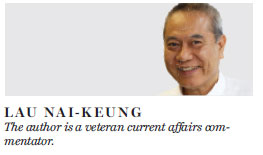Time to reflect on the lessons of the 'Occupy Central' protest
Updated: 2015-09-22 07:08
By Lau Nai-keung(HK Edition)
|
|||||||||
The first anniversary of the illegal "Occupy Central" movement is approaching. It gives us an opportunity to reflect on what we have learned after the illegal protest a year ago.
On Sept 26 last year, members of the Hong Kong Federation of Students and pupil-led protest group Scholarism barged into the forecourt at government headquarters in Admiralty. The movement officially started two days later on Sept 28, after almost two years of planning, focus group studies, and a civic referendum.
The "Occupy" movement wanted to defy the notion that Hong Kong is part of China, with all the implications that flow from such a notion when it is duly observed. Of course, the movement presents itself as something much less radical.
A year ago, the protesters blocked the streets to pressure the central government into granting an electoral system according to "international standards in relation to universal suffrage" in the Chief Executive election in 2017. All that the protesters wanted, so we were told, was "genuine democracy". The slogan was so harmless that it appealed to many innocent Hong Kong people and secured their support. In reality, what the protesters deemed "genuine democracy" was incompatible with the Basic Law and would undermine Chinese sovereignty in Hong Kong.
Unfortunately, many of the misunderstandings about the Basic Law and the design of "One Country, Two Systems" are still prevalent in Hong Kong.
During the 25th anniversary of the promulgation of the Basic Law, Director of the Liaison Office of the Central People's Government in the Hong Kong SAR Zhang Xiaoming's reiteration of the general principles of "One Country, Two Systems" and the Basic Law sparked controversy again.
"The Chief Executive's dual responsibility (to both Hong Kong and Beijing) means he has a special legal position which is above the executive, legislative and judicial institutions," Zhang said during his 26-minute speech for the occasion. This statement became the focal point of much criticism of Zhang by dissidents.
Patriots have defended Zhang's viewpoint. In an interview with Xinhua News Agency at its headquarters, Secretary for Justice Rimsky Yuen Kwok-keung said Beijing and Hong Kong need to understand the Basic Law and the principle of "One Country, Two Systems" from each other's perspective. As such, Yuen noted, the Basic Law cannot be observed and understood from a single perspective.
"It should be looked at from Hong Kong's perspective as well as the central government's perspective, or else the two systems cannot coexist under the protection of the 'One Country' framework," Yuen said.
Yuen's remarks are very interesting. In his opinion, Hong Kong represents one system while Beijing represents the other. The two systems "coexist" and Hong Kong and Beijing are like equals.
That makes senses, except Beijing also represents the "One Country" and as such also has a "dual role" and a "dual responsibility" to both the socialist system and to the country as a whole.
So what Yuen may actually mean is this. Wearing the hat of the socialist system's representative, Beijing needs to understand the Basic Law and the principle of "One Country, Two Systems" from Hong Kong's perspective. However, wearing the hat of the country's guardian, Beijing can make decisions not solely based on Hong Kong's perspective.
Yuen is a true lawyer and is really good with words. He pointed out that the Basic Law cannot be observed and understood from a single perspective. He did not say it can only be interpreted by one single organ. Article 158 of the Basic Law says, "The power of interpretation of this Law shall be vested in the Standing Committee of the National People's Congress." The Basic Law does not require that such interpretation be based on understanding by another party.
"On many occasions, Hong Kong does not understand the mainland's legal situation; or the mainland does not understand Hong Kong's legal situation," Yuen told Xinhua. (We should note that such a lack of understanding did not prevent the National People's Congress from passing the Basic Law and its Standing Committee from interpreting it.) "So this produces a negative effect," Yuen acknowledged.
A year after the start of the illegal "Occupy" protests which lasted 79 days and caused much anxiety and inconvenience, things are still as confusing as ever - if not more so. We managed only to clear the protesters from the roads, but not from the minds of our top officials, not to mention those of the public. But since the roads are now cleared, life appears to go on as usual.

(HK Edition 09/22/2015 page8)